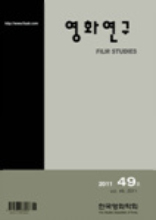- 영문명
- Making Cinema-State: Thoughts on Socialist Cinema Aesthetics through Film Art (a.k.a Yongwhayesulron)
- 발행기관
- 한국영화학회
- 저자명
- 김선아
- 간행물 정보
- 『영화연구』제48호, 117~151쪽, 전체 35쪽
- 주제분류
- 예술체육 > 예술일반
- 파일형태
- 발행일자
- 2011.06.30

국문 초록
영문 초록
A foundation of North Korean cinema was established during the 1960s to 1970s and Film Art by Kim Jong-il is placed in its core. Re-mediating Kim Il-sung Suryung(the great leader)'s struggle and revolutionary operas written by Kim Il-sung into cinema as a modern technology, Kim Jong-il reformed North Korea as Cinema-state. In doing so, the heredity of the dictatorial power was naturalized and necessitated just as a transmission to new modern media. Cinema operated as signs of everyday life which North Korean people could interpret their reality through, and provided an opportunity that people took part in and shared Kim Il-sung Suyung's myth. As accelerating the centralization and unification of economy, politics and culture under the name of Suryung, North Korean cinema has been distorted with a drastic development. Kim Jong-il deleted the existing film history with emphasizing the tradition of revolutionary cinema and wrote Film Art that became the origin of other art theories. Since then Kim created films of the Suryung figure and established the Juche Idea(self-reliance/subjecthood). The procedure of development of North Korea film history from a revolutionary cinema during 1960 to 1970 and Film Art to a cinema of a Suryung figure let us know a birth and fall of Kim's Cinema-State and a perfect union of technology and state power. Film Art provided the foundation for the aestheticization of politics and melodramaticization of a history in the Cinema-state. Film Art was the only art theory written by Kim Jong-il in the 1970s where Kim reckoned cinema as the representative art of socialist realism for the age of independent and creative Juche. It emphasizes a human being's consciousness-raising, the organization of feelings and contents. At the same time it inherited the problems of romanticism, organicism and passive human being. The illusion of Father-Nation-State on a huge cinematic screen in North Korea during the 1960s to 1970s were vanished. Cinema-State faced to the end because of intolerable distance between a reality and a cinema and the development of multimedia technology.
목차
1. 영화국가로서의 북한
2. 창조적 적용과 독창적 발명
3. 주체시대의 사회주의사실주의
4. 비판적 결론
키워드
해당간행물 수록 논문
참고문헌
최근 이용한 논문
교보eBook 첫 방문을 환영 합니다!

신규가입 혜택 지급이 완료 되었습니다.
바로 사용 가능한 교보e캐시 1,000원 (유효기간 7일)
지금 바로 교보eBook의 다양한 콘텐츠를 이용해 보세요!


